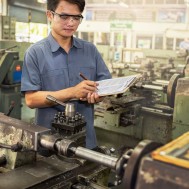For manufacturers, productivity is one of the most important factors in maximizing profits and staying ahead in the industry. Taking proper care of equipment is the first step in boosting production and eliminating downtime.
In order to ensure machinery is running to its fullest potential, it’s important to conduct routine performance checks and make sure workers are fully trained to handle the equipment properly. Here are the steps you should be taking to effectively extend the lifespan of your manufacturing equipment:
Make sure all employees are properly trained.
Every company will eventually experience employee turnover. When new workers arrive, it’s important that they receive proper training on all equipment. Every operation, from basic usage to understanding maintenance procedures will help ensure that employees will be able to locate a problem as it arises.
Without appropriate training, basic protocols may be missed and machines could be used improperly or even damaged, leading to a shorter lifespan of equipment. Setting up proper training sessions or onsite classes will be a major benefit to your employees, machinery and company overall.
Regularly check for wear on equipment.
Through time and consistent use, it is inevitable that machinery is going to wear down. While there’s no direct way to prevent this, understanding what causes the breakdown of equipment and routinely checking for it can help to slow down the process.
Catching small signs of wear early on will allow you to be proactive in preventing further wear and damage to equipment. In heavy machinery, vibration, shock, high temperatures, friction and age all have a negative impact over time. Someone should always be monitoring equipment to make sure everything is aging at the right pace.
Have a structured maintenance schedule set in place.
More often than not, routine check-ups on equipment are often put off and forgotten. Keeping in mind how easy it is for equipment to become overworked, proper checks are critical in making sure all systems are running smoothly. This will reduce the risk of potential repairs and downtime, leading to a boost in productivity. At Apple Rubber, we have a preventative maintenance module in our ERP system that drives work orders for routine maintenance. This small but useful addition to our system will ensure all maintenance is taken care of right away.
Even the most minor pieces of equipment are often critical to larger operations, like fluids, tracks and electrical systems. These should be checked regularly, as they often create larger issues for machinery if they malfunction or break. A few minor but necessary checks that should be completed regularly include checking for wear in seals, torque checks on bolts, lubricating gears and changing filters.
By taking these necessary preventative measures, it is possible to prolong the lifespan of your equipment. Being aware of warning signs and potential risks for damage will help you take the steps you need to ensure your machinery is aging properly.
